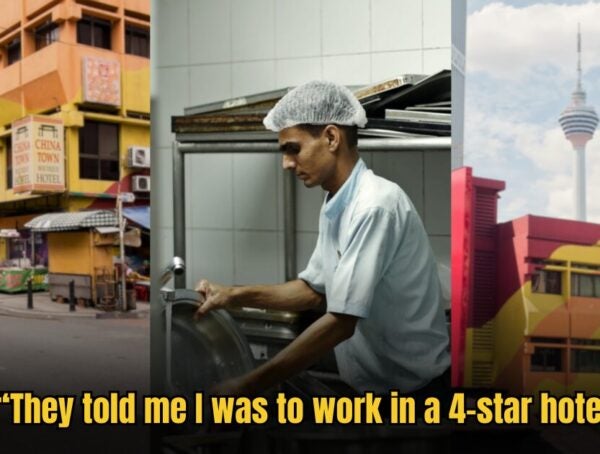Disclaimer: In Real Life is a platform for everyday people to share their experiences and voices. All articles are personal stories and do not necessarily echo In Real Life’s sentiments.
Subscribe to our Telegram for updates
Chan is a Malaysian who began his overseas journey in Japan as a student of the YTP (Young Talent Programme), run by MARA University of Technology.
After graduating from Tokyo University of Technology with a bachelor’s in Engineering, he moved to Aichi Prefecture, Honshu to start work in the automotive industry manufacturing internal car parts.
Chan has been working for only 1 month, and because he hasn’t been confirmed yet, he couldn’t take leave to come back to Malaysia to celebrate Raya. So he spent it with his colleagues and friends in Japan.
“Not going back for Raya is always a sad feeling. Of course my family wasn’t happy with the decision either, but I have to plan for my future as well,” Chan shared.
What it was like to celebrate Hari Raya In Japan
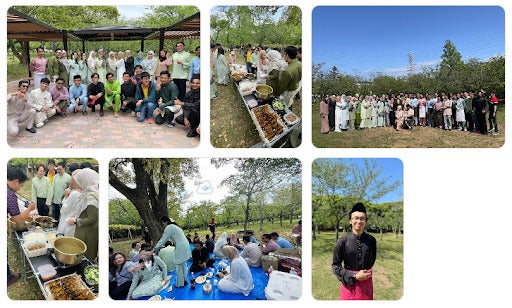
Image: Chan’s experience celebrating Hari Raya in Japan with other Malaysian and international Muslims.
The picnic started at 12 pm Japan time on 1st Syawal. Chan prepared his best baju melayu (Raya festive garment) and made some kuah kacang (peanut sauce).
The picnic was held at one of the parks in Toyohashi area in Aichi prefecture after solat Raya. All food was prepared the evening before by every attendee in the gotong-royong (Malay community) style.
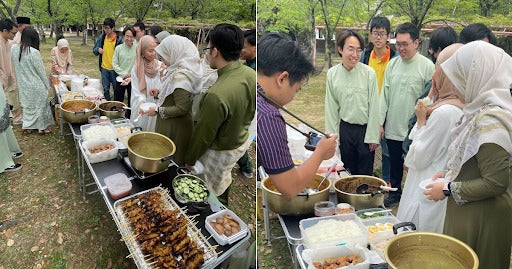
Image: People lining up and queuing for Raya food at one of the parks in Toyohashi area, Aichi prefecture during a Raya celebration.
The Raya menu consisted of satay, soto (traditional soup dish), nasi minyak (scented rice), nasi impit kuah kacang (rice with peanut sauce), and rendang ayam (curry chicken) and rendang daging (curry beef).
Attendees included Muslims and non-Muslims from other countries such as India and Russia.
“They commented on our songkok (headgear) and samping (ceremonial sarong), saying they look beautiful and colourful. The dishes were a bit too spicy for them, but they enjoyed the flavours nonetheless,” said Chan.
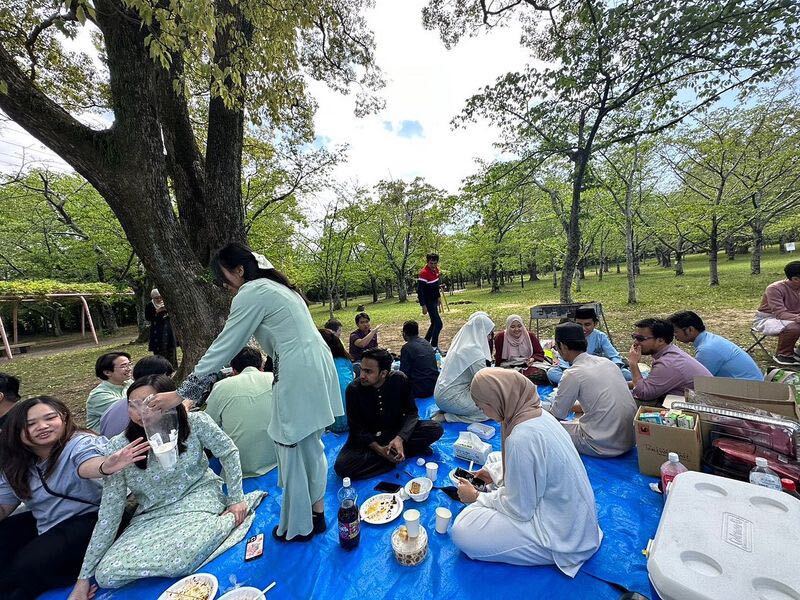
Image: People sitting down and having a picnic style lunch.
As it was an open house in the style of an outdoor picnic, it was very chilly in the morning but scorching hot in the late afternoon.
Some Malaysians made the mistake of wearing black, which led to a kerfuffle as many had to shift positions to find shade under the trees out of the scorching heat.
“We chit-chatted about our jobs, routines, how our colleagues are, comparing Japanese and non-Japanese, plans for the future, and even marriage. Even though we were all young adults, still the old-but-gold question gets thrown around,” chuckled Chan.
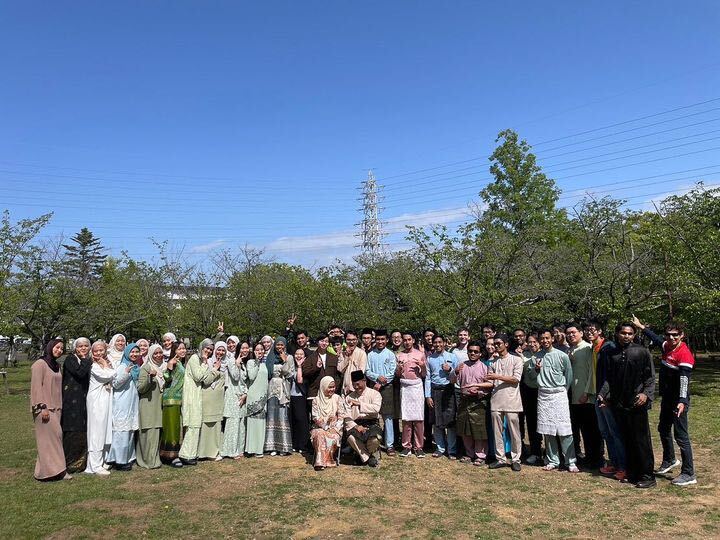
Image: The couple that sits at the front in the middle of this group photo are parents of an ex-student who entertained attendees with their stories.
“There was a married couple who helped us all feel connected with the traditions of rumah terbuka (open house) with their ‘dah makan garam’ stories,” shared Chan fondly.
The Raya gathering attracted a lot of stares from passersby, but the Malaysians welcomed anyone who greeted them with a few satay and food.
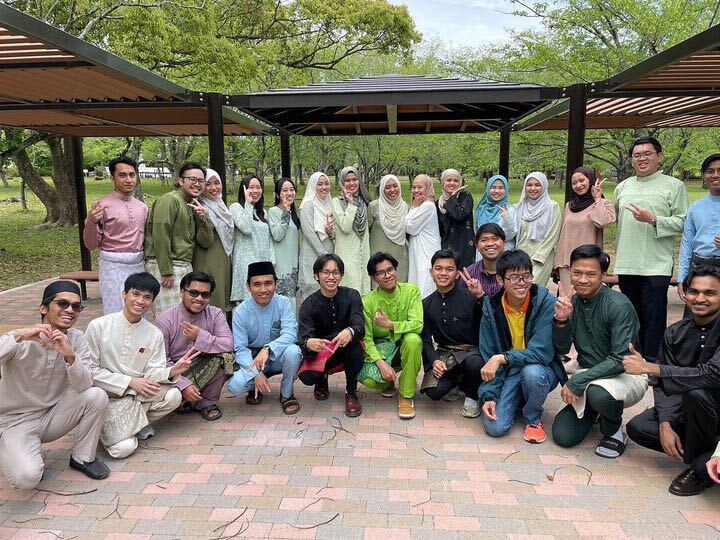
Image: Students and ex-students of Toyohashi University of Technology gather for a group photo.
Chan: “I had the pleasure of knowing the students from Toyohashi University of Technology since December. They were very friendly and quickly got along with new people as being a Malaysian in foreign land teaches us that way.”
Other students who attended the Hari Raya gathering had this to say about the event:
Wan Yusuf Bin Wan Ahmad Kamil shared: “I was glad to be able to co-host the eid feast with my friends this year. The vibe is not the same as last year because most of my friends have either gone back to Malaysia or moved away, but it was still fun.”
Khairul Haznik bin Daud shared: “It made me miss the suasana of beraya di kampung (the vibe of Eid in my hometown) with my big family… The kids running around with some of their moms saying manglish words, which is always funny to me. It makes me miss Malaysia more. The food was incredible. Everyone lent a hand prepping the dishes that made us feel at home. It’s not the same, yet it does feel very Malaysian.”
Syazwan Zaki bin Ahmad Hairi shared: “Next year I’ll be going back to Malaysia as I will be finishing my study in March, so I hope my kouhai (juniors) will be able to continue this open house tradition that we’ve been doing for years.”
What it’s like to observe Ramadan and Hari Raya in Japan
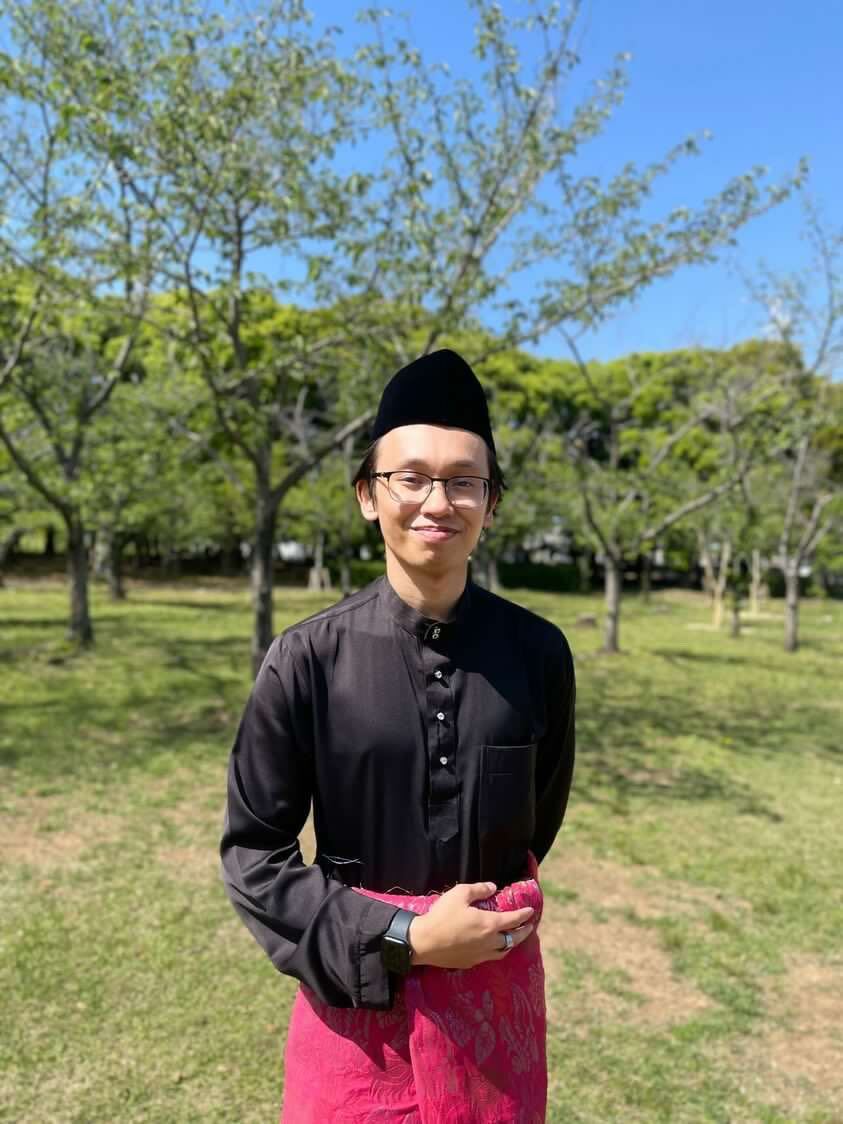
Chan took a video of the mosque he attended for solat. Watch the video here.
Raya 2023 falls on a weekend, so luckily for Chan and his Malaysian friends, they didn’t have to apply for cuti (leave).
Raya is not a public holiday in Japan. There are two main holidays that the Japanese observe here, which are Golden Week and the Japanese New Year celebration.
Chan’s Raya experience was almost similar to his usual in Malaysia, with the exception of the bersalam-salaman, bermaaf-maafan (ask for forgiveness) ritual and the ziarah (pilgrimage) open house.
“The solat Raya was an eye-opening experience for some of us, as we saw first hand that Muslim are not all Melayu or Indonesia, there’s all sorts of races but all are Muslim at heart,” shared Chan.
As for the month of fasting, Ramadan, the days are shorter due to the position of Japan relative to the sun, and the season which is Winter-Spring.
“I miss the bazaar quite a lot. But my iftar (breaking fast) has never been lonely with friends and my family who came to visit me during Ramadan,” shared Chan.
“In Malaysia, I always hear about how in other countries, Ramadan is more celebrated rather than Raya, and it is true hearing from the international Muslims themselves,” shared Chan.
What it’s like to visit a mosque in Japan
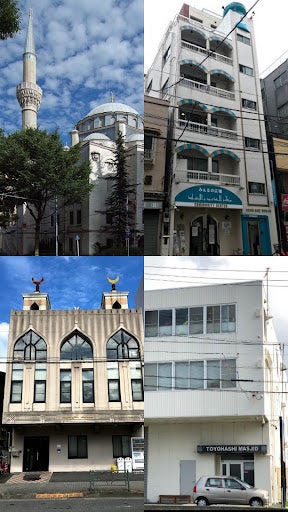
Image: Camii mosque, Okachimachi mosque, Hachioji mosque and Toyohashi mosque.
Chan shares that he’s visited four mosques in Japan: Camii mosque, Okachimachi mosque, Hachioji mosque and Toyohashi mosque.
The architecture of each mosque isn’t as grand as Malaysia’s mosques, but they serve their purpose to unify Muslims from all walks of life.
They are a learning centre as all of the mosques occasionally hold learning programmes or camps for all ages and nationalities.
One of the main differences when it comes to comparing the mosques here and the ones in Malaysia is that Japanese mosques don’t have the privilege of having the qibla.
The qibla is a direction for prayer that points to the Kaabah, in Mecca. In Malaysia, mosques and prayer halls are designed following the direction of qibla.
In Japan, the mosques are buildings that had been built without that initial purpose in mind, so the saf lines (a line during prayer) are at an awkward angle.
However, it does signify the ukhwah (“brotherhood” or “sisterhood”) between Muslims of all generations and races.
What it’s like to work in Japan as a Malay fresh grad
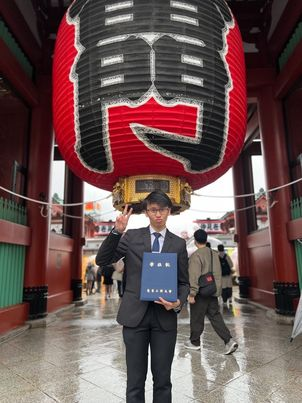
Chan had found his first job after 6 months of gruelling job interviews, so he wanted to make the best of the opportunity.
“The work culture is quite bizarre compared to Malaysia,” shared Chan. “They are very punctual. If you’re even 1 minute late, you have to explain why you are late. But they don’t go back punctually! They come early and stay late.”
According to Chan’s observation, the people here rarely prioritise work-life balance especially among the older generation.
Chan: “They hold on true to their culture, which is that the husband needs to go to work, while the wife sits at home managing the house.”
He added: “This creates sort of an imbalance in the house income, hence, the husband often enters work early in the morning and goes back when the sun already sets.”
Chan shared that he is grateful for the opportunity to work in Japan and wishes to stay as long as he can to gain experience before coming back to Malaysia.
Do you have a personal story? Email us at ym.efillaerni@olleh
For more stories like this, read: https://inreallife.my/4-ways-a-japanese-company-works-differently-from-a-malaysian-one/
You might also like
More from Real People
‘A RM100 fee cost a company 5 years of revenue’ shares M’sian
This story is about a Malaysian who learned that bureaucracy can be defeated simply by not arguing with it.A billing …
‘I quiet-quit, upskilled, and tripled my salary,’ shares M’sian engineer
This story is about a Malaysian who learned that loyalty without leverage leads nowhere in the corporate world.After years of …
‘I did everything right, and it still wasn’t enough’ shares M’sian graduate
This story is about a Malaysian graduate navigating big dreams in a job market where a degree no longer guarantees …








